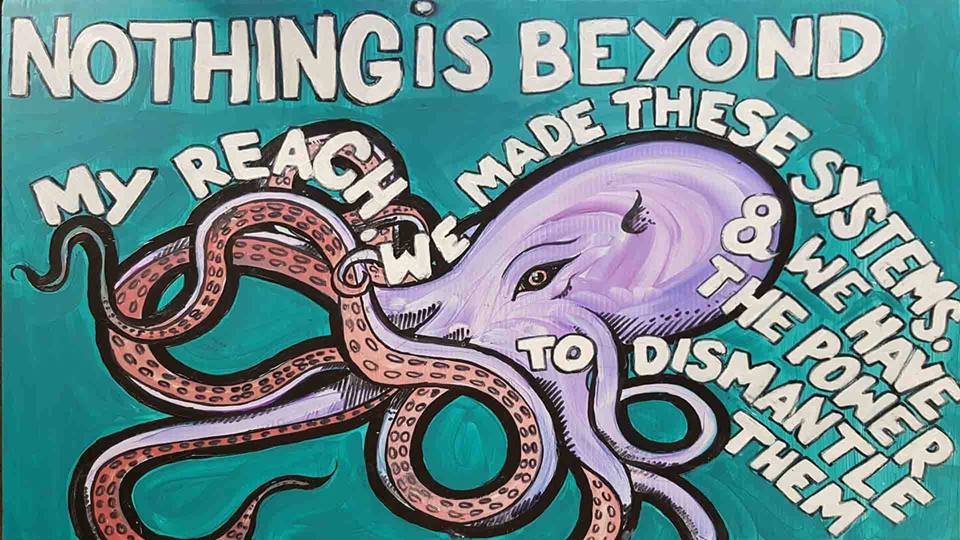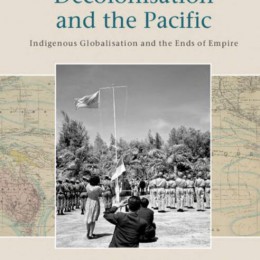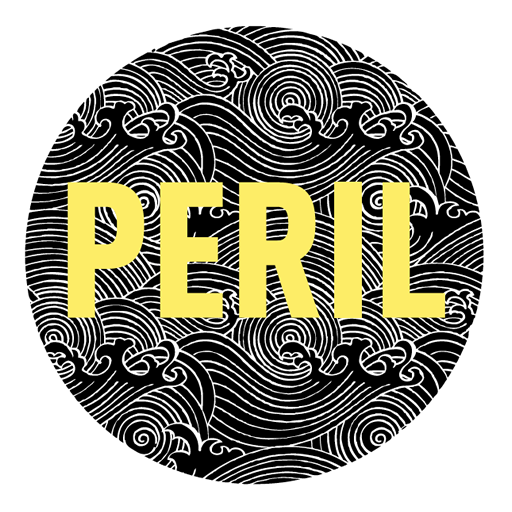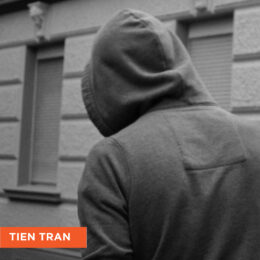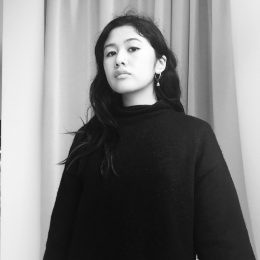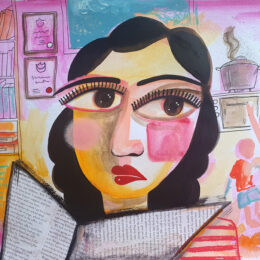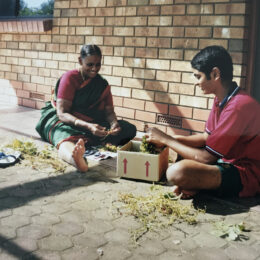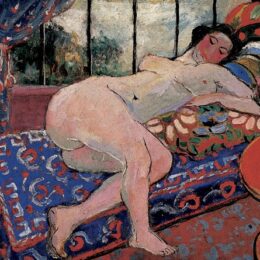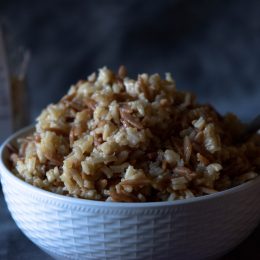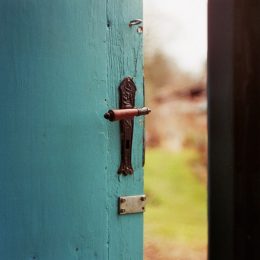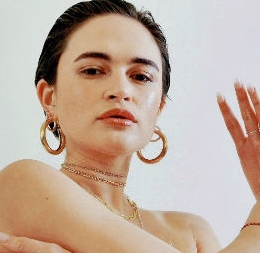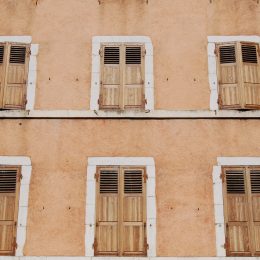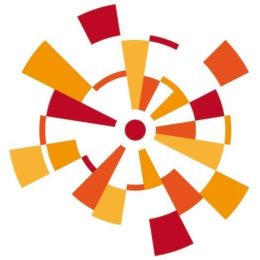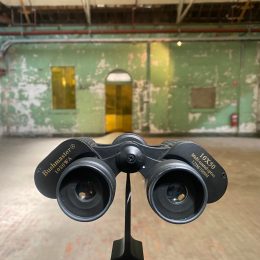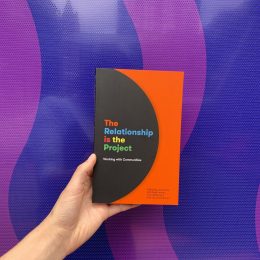The cis-sexist and white supremacist textures of colonisation has created and supported a gender binary system that has led to the discrimination and systemic oppression of trans, gender diverse and two-spirit people. How do we push back? What are the tools and frameworks we need right now? How might trans politics use legal systems as a tactic for survival and dismantling structural violence whilst ensuring that our transformative demands are not watered down? Join us as Philip Marrii shares a First Nations perspective on gender diverse identities. Then Matilda Alexander & Sujay Kentlyn will discuss new anti-discrimination laws that have significant implications for the rights of trans and gender non-binary people. These 3 speakers will share first, then there will be time for Q&A and discussion. People of all genders and allies are invited. Please share with your trans, gender non binary and ally friends. We can all be better Read More »
Via Melbourne Feminist History Group We are looking forward to our next seminar, when we will be hearing from A/Prof Tracey Banivanua Mar on the circulation of the word ‘Black’ around the Pacific during the 1960s and 1970s. The abstract is below. As usual, we will be having dinner after the seminar. All welcome. If you can make it to dinner please let us know by Wednesday 11 May ([email protected]). Hope to see you there! MFHG. Decolonisation and the ‘Black’ Pacific: gender, race and the pursuit of consciousness Associate Professor Tracey Banivanua Mar, La Trobe University This paper tracks the mobility of the transformative word, ‘Black’, as it circulated the Pacific’s oceanic world during the 1960s and 70s. Carried in the minds, words and pamphlets of radically mobile Indigenous peoples it wove a web that eroded colonialism’s power to isolate and marginalise. As such it confounded the covert circuits of Read More »
I read a version of this last week for Queer Nerd, a Midsumma event curated by Lisa-Skye. There’s a lot more I could say about how East Asians are feminised (while other people of colour are masculinised) but maybe I’ll continue that rant later. I think when I was a kid, I thought my gender was nerd. Of course that’s not all there is to it – I was a girl too. And I think it’s pretty silly when cissexual people like me deny their privilege just because we’re not all quarterbacks and cheerleaders. Besides, I don’t believe that it’s the soldiers and sportspeople who have the most male privilege; I think it’s often the scientists and statesmen, the judges, the economists – the nerds. But if boys play with trucks and girls play with dolls, I was the nerd with five library cards who wanted to read just one more Read More »
The point of reckoning with the social organization of forgetting is, if it is anything, to craft a future different from the horrific past we have collectively inherited and differentially live in the present. — Alexis Shotwell, Against Purity What kind of times are these? Early in the morning of September 11, 2001, I woke to the sight of my mother, crying and speechless, in front of our living room TV. Two buildings in New York have been hit by planes, she said eventually. Beyond the physical act of destruction, I wasn’t sure what this could mean. At school that day, my Grade Four teacher attempted to disperse rapidly metastasising rumours as if targeting flies with a swatter. Bin Laden is not hiding in Australia. Now, back to your work. My sister and I saw it for ourselves on almost every channel that night: office workers plummeting, disembodied voices leaving Read More »
Since February 2021, I have been working with people who are struggling with scale of crisis and our ability to sustain critical community support. We grew as the need grew: love and urgency pushing the boundaries of our capacity each time. Each time we were presented with breaking point, the ever-present community pushed us forward. With gritted teeth, I would remind myself, that this is mutual, this is care. In conversation with friends about their collectives, we asked ourselves if this kind of burning—rage, love, grit—can be sustained in the long term. This question, along with the rest of the world, remained in abeyance; we talk in circles, reminding ourselves that crisis is ongoing, support is critical, we cannot keep going, we must keep going. And each time we conclude that with love as our compass, we will keep the fire going. Returning to bell hooks’ All About Love, I Read More »
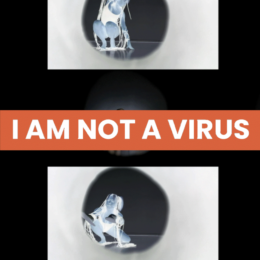
Anti-Chinese and Asian racism in Australia is not new. But the advent of the global pandemic has seen an intensification of physical and verbal attacks. This has directly impacted on artists, as reported in Diversity Arts Australia’s 2020 Creatives of Colour Impacts of COVID Survey. Further evidence of this COVID-fuelled racism is the Asian Australian Alliance’s COVID-19 Coronavirus Racism Incident Report Survey, which Diversity Arts was also a partner on, and which documented over 500 reports of incidents, including verbal threats, physical intimidation, denial of services, workplace discrimination and being coughed and spat upon. In response to this, Diversity Arts developed I Am Not A Virus, an artist-led initiative to confront xenophobia and racism through creativity. Making art and sharing stories are powerful ways to engage people in these discussions and provide counter-narratives. Sixty eight Asian-identifying creatives from all States and Territories in Australia have been commissioned to create new Read More »
Content warning: This is a work of fiction. This piece of writing contains words and graphic references on drug usage, racial and/or gender violence that may upset readers. The toilet paper isle stood bare metal at Coles Greenacre for a month straight. Another shopper, an Islander, bounced his shoulders and asked me, “What’s wrong with people ay?” Bags under his eyes puffed like a frog’s throat, mine too, because no one was getting any sleep. Heads fuzzy from our fades growing out to at least a number four. Then Mum called and said, “Trời ơi!” It was the same back home in Perth. Luckily, she hoards all year round, even before Covid, buying a carload whenever Sorbent’s on sale for three dollars fifty per pack of ten. She told me not to come back until Sydney had Covid under control, my own mother. Mark McGowan had already closed the border Read More »
We started this decade on an uncertain note, and as we enter its second year, so much remains unresolved. We are teetering on the cusp of massive change – social and political. Change comes in both increments and inexorable waves. What can seem ‘sudden’ is more often than not the result of hard work, persistence and patience. Through all of this, there is one thing we remain certain of: Peril is people. This publication and this community exists because of you – our readers, contributors, editors, volunteers, partners and board. We are grateful for all your support. ‘2020 has begun with a compelling wake up call, asking us to understand the nature of interdependence,’ we wrote in February last year. Each unfurling month has revealed just how much we need each other. Amid the tumult of 2020, we produced three very different editions. In our first edition for the year, Read More »
Illustration by Amani Haydar A few weeks ago, the PR department at the university where I teach and study arranged an interview with a journalist from a local newspaper, to discuss my plans for life after the completion of my PhD. I had recently been awarded a small grant to develop a new work of Young Adult fiction, and that, coupled with my recent invitation to take up a residency with Sweatshop, a literacy movement in Western Sydney devoted to empowering culturally diverse communities through reading, writing and critical thinking, seemed to be a lifeline at a time when publishing was going through a significant lull. That same week, eight Australian magazine titles were officially closed, the latest hit to an industry already battling decreased Arts funding and COVID-19. The journalist rang outside my working hours, when I was home alone with my two children. I had specified my availability Read More »
1 In my early to mid-twenties I had an unstable sense of who I was. This is not uncommon at this age. But drawing on the well of this feeling, from a distance of years, throws light on the particularity of this instability, and on the cultural grammars that formed me. My family had moved back and forth across the Indian Ocean, first leaving rural Tamil Nadu for Wollongong, then settling back in Chennai, then in Adelaide, when I was between the ages of six and twelve. In the four years we spent in New South Wales, I acquired an Australian accent, which must have felt to me like my ‘first’ way of speaking English by the time we returned to Tamil Nadu. These movements had to do with my parents’ aspirations: Mum had been accepted into a postgraduate degree in Wollongong, and they aimed to use that to Read More »
“If only recovering the silenced history / is as simple as smashing its container: book, / bowl, celadon spoon. Such objects cross / borders the way our bodies never could.” —Sally Wen Mao, “Occidentalism” There’s a memory that persists, despite all these years, in which I am staring at a photograph of myself projected onto a white wall. In this impression, I am seventeen, standing in the makeshift library of the art classroom where I spent most of my final year of high school. I am tracing this photograph, a self-portrait, onto a large sheet of watercolour paper—another self-portrait. When I raise my hand, I mirror the outline of my body in the projector’s beam. Alone, emboldened, I press my cheek against her cheek, which is my cheek, and yet also not. The wall is cold against my skin. I recoil like I’ve been stung. This act feels perverse, and Read More »
Last year, I rejected an Asian man. Apparently, there’s a lot of politics around this. But I had my reasons: a) I identified as a lesbian at the time, b) I was dating a woman, and c) I wasn’t attracted to him. They didn’t seem to satisfy him – unsurprisingly, as he already knew my relationship status. I asked him why he couldn’t find available women on a dating app instead of trying to proposition lesbians with girlfriends. His response was this: ‘Asian and white women don’t want to date Asian men.’ These words have haunted me since. I had long been sympathetic to Asian men who railed against their characterisation by Western media as emasculated and undesirable. But the context of his comment rubbed me the wrong way, like he was implying that the real reason that I had rejected him was not because of my sexuality, but internalised Read More »
August 2020, a bad beginning to the last month of winter. As morning frost turned our garden white, daily coronavirus case numbers in Australia topped 700. And 14 years after my partner went into remission from non-Hodgkin lymphoma, the spectre of cancer re-entered our lives. Just before Christmas 2006, we’d said goodbye to his 8.6-kilogram spleen – an organ normally weighed in grams that had turned into a massive tumour. As 2007 rolled in, he endured weeks of chemotherapy. Sleepless nights, brought on by enormous doses of steroids, accompanied the poisons injected into his body, leading to yo-yoing weight. We got lost tracing the pin-cushion punctures from syringes and cannulas on his skin. He went missing in our neighbourhood on a night walk to clear his fuzzy brain, having to be rescued from beside a public phone. I resigned myself to the fluctuating emotions any carer goes through: annoyance, gratitude, Read More »
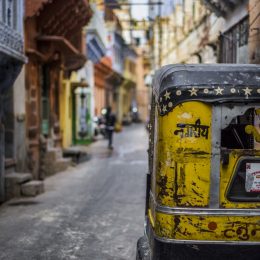
COVID-19 in India: discrimination, displacement and disaster management The COVID-19 pandemic has revealed people’s capacity for both misanthropy and social solidarity globally. In the early days of the epidemic in Wuhan, China, when news about the emergence and spread of the novel coronavirus, SARS-CoV-2, started coming out, India, like many countries, saw a surge in racist incidents involving people who looked East and South-East Asian. The upsurge included some truly bizarre incidents in some major cities. People from the north-east of India, many of whom share phenotypic features with people of South-East Asian ethnicities (and, at the very least, can for the most part be distinguished from northern and southern Indians), experienced random acts of ‘opportunistic’ discrimination in the mainland. While harassing people perceived as Chinese is awful and despicable in any context, it is especially egregious in mainland India, which has a widely dispersed and arguably well-integrated population Read More »
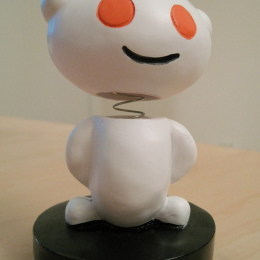
This decade has seen the rise of the alt-right, the “red-pill” movement and similar social trends. Typically associated with white nationalist sentiment, these discourses have also permeated elsewhere. I examined the extent and nature of these narratives among users of the popular online forum Reddit, analyzing forum posts written by those identifying as, or who can reasonably assumed to be Asian-Australian. I investigated the attitudes of posters towards gender and race relations and being an Asian male in modern day Australia, demonstrating the porosity of individual identities to global social trends. Ironically, the beliefs and values of online posters were themselves shaped by the powers that they resent. I contended that there are significant implications of popular online cultures for Asian male self-imaginations in our current society. I selected four of the most relevant discussion forums, or “subreddits” related to Asian male experiences (r/hapas, r/aznidentity, r/EasternSunRising and r/AsianMasculinity), encompassing 22 Read More »
I received the green light for this review while lying in bed with a deadly cold. Groaning and coughing post-nap, I changed out of my Ice Bear onesie, tidied my tissues, chugged a sachet of tolak angin, and shuffled my way to SIGNAL.[i] The night’s event was a celebration for the release of Rosie’s EP, Mythologies, which was inspired by the stories we tell ourselves, narratives about our cultural community, and mythical creatures. The crowd was sparse before seven so I beelined for the snack table (wo)manned by two ladies in kebaya. “Hello,” one of them, who I later found out is Komang Rosie Clynes’ mom and muse, greeted me. “Halo halo.” “Ahh,” she said. Everyone around the table immediately broke into warm smiles. “Indo ya?” I nodded sheepishly, not wanting to say something in Bahasa and sound clumsy. She laughed and gestured at the food. “I don’t need to explain Read More »
Introduction I’d like to thank the organisers of this conference for inviting me to speak, especially since I feel very unworthy of being up here. When Mridula first asked me to present a talk at this conference, I declined because I don’t feel I have sufficient expertise in Asian Australian Studies and identity politics to do so. I am so acutely aware that I am no Jacqueline Lo or Tseen Khoo, or any of the younger scholars who have presented such fascinating work on Asian Australian identities in recent years. Mridula, however, convinced me that my insufficient ‘wokeness’ did not preclude me from presenting a very particular and personal point of view on this topic, even if it may now be outdated and under-theorised. Then I looked at the list of topics for this conference, and I felt like an old relic that should be relegated to the archives. That Read More »
Diversity Arts Australia (DARTS) invited participant writers to reflect on the Stories from the Future project, which gathers culturally and/or linguistically diverse creatives from across Australia to imagine equitable alternative futures for the arts. This project is a partnership between DARTS, the University of Sydney and state partners and receives core support from the Australia Council for the Arts, Create NSW, City of Parramatta Council and Liverpool City Council. Last year, I was able to attend the Stories from the Future workshop on Ngunnawal country/ Canberra with a number of culturally diverse artists and arts workers. In it, we imagined that by 2050 cultural diversity would be fully represented across the arts. What would it take to reach this goal? I felt privileged to share this space with a number of artists from refugee and migrant backgrounds. Their frustrations with lack of recognition and remuneration by mainstream institutions mirrored the Read More »
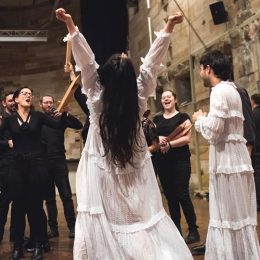
Created and performed by Marcus Whale and Eugene Choi, Praise! draws inspiration from Psalm 150, in a “goth church service” that aims to celebrate the “intersections of the sacred and sensual”. This hour-long work begins with five gender-ambiguous performers crawling down the recessed seating bank of the Brunswick Mechanics Institute, dressed in white nightgowns and long black wigs (for those performers not sufficiently hirsutely endowed), in a costuming choice somewhere between The Ring and Picnic at Hanging Rock. Over several separate movements, the performers transition from a relatively natural choral setting of the psalm with its praiseful trumpets, harps and lyes, through spoken word, hematoma-inducing headbanging, noise and growl, back through choral duet and symbolic movement — while drone and soundscape reverberate through the spartan black space, which features a single cube of metal scaffolding. Next Wave, which commissioned the work for Asia TOPA, has a reputation for experimental new Read More »
According to the promo, When It Rains (I feel like eating Jeon) is an installation inspired by the story of a Korean elder in Ansan, who takes a walk every day to the place where the sea used to be. This work considers the solvent connections between site, sensation and memory, and the routines that we associate with these.” Sparely set in the Magdalen Laundries of the Abbotsford Convent, the installation features soundscapes in a largely empty space, periodically interrupted by stations that focus attention and toy with the sense of distance and closeness either through gaze, video or miniature installations. Audiences are free to connect with as many or as few elements of the installation as they desire and the minimal explanatory text allows space for individual response. Many of those responses are captured in a small notebook at a station that returns the gaze back into the installation Read More »
This speech was delivered on 3 February to launch The Relationship is the Project, a new resource that aims to help practitioners, artists and cultural workers better engage with community-based projects. The work was commissioned and curated by Jade Lillie for her 2017 Sidney Myer Creative Fellowship. The book is co-edited by Kate Larsen, Cara Kirkwood and Jax Jacki Brown, and features chapters from thought-leaders across Australia’s arts, cultural and community sectors. The Relationship is the Project is available from Brow Books and awesome booksellers. Ask for it by name. Depending on how you get your news, you probably woke today to devastating natural disaster, political trauma, and the spectre of a global contagion. Fear and xenophobia that is, not Novel Coronavirus. Against this planet-wide context of complex systems failure it can feel, as Allison Croggon recently described: “Fatuous to talk about Australian art and culture amid such overwhelming global crises Read More »
